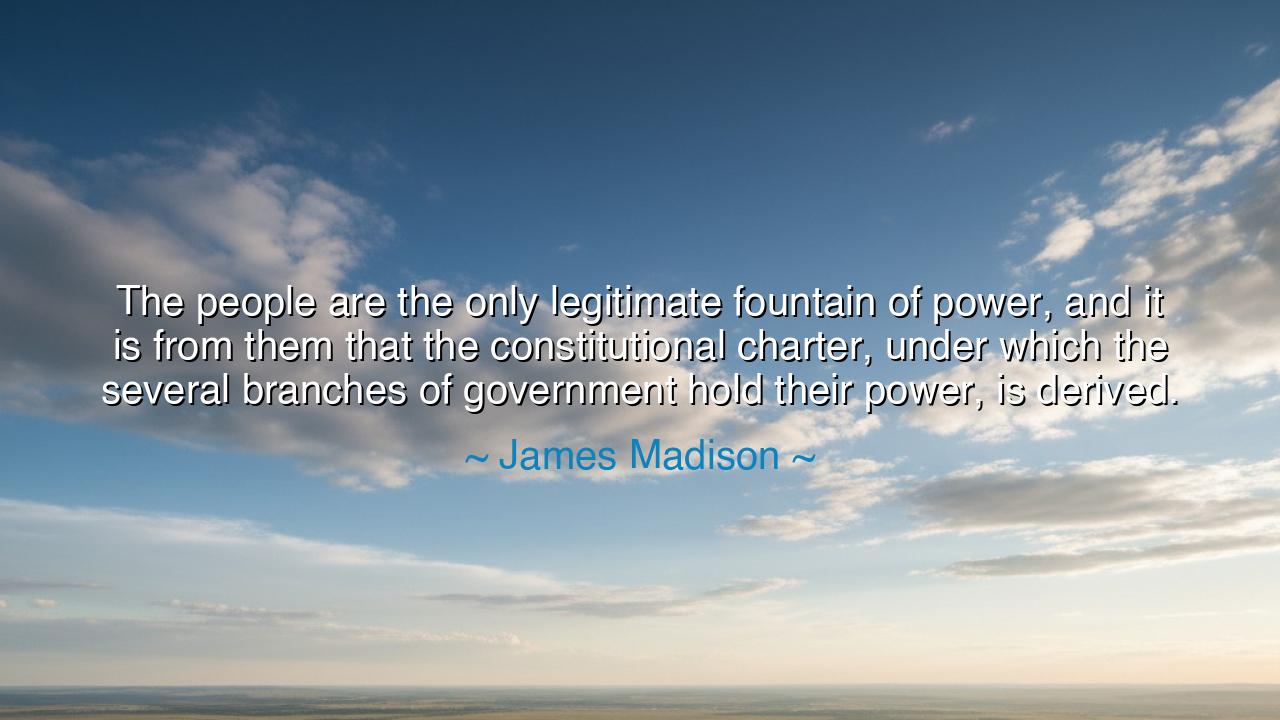
The people are the only legitimate fountain of power, and it is
The people are the only legitimate fountain of power, and it is from them that the constitutional charter, under which the several branches of government hold their power, is derived.






In the grand tapestry of liberty, woven through the centuries with courage and sacrifice, there shines the enduring truth spoken by James Madison, father of the Constitution and guardian of the Republic’s soul: “The people are the only legitimate fountain of power, and it is from them that the constitutional charter, under which the several branches of government hold their power, is derived.” These words, carved in the marble of thought and history, remind every generation that the highest throne in a free nation belongs not to the ruler, but to the ruled. It is the people—not kings, not armies, not parliaments—who are the wellspring from which all authority flows.
In the age of Madison, the world still trembled under the shadow of monarchy. Europe’s crowns glittered with the illusion of divine right; kings declared themselves the voice of God upon the earth, and subjects were but their obedient instruments. Yet across the ocean, in a new and fragile land, a revolution had torn down those idols. Men and women who once bowed to distant sovereigns now stood upright, declaring themselves sovereign instead. Madison’s words arose from that sacred rebirth. He spoke not as a rebel, but as a philosopher of freedom—one who understood that power without consent is tyranny, and that governments, like rivers, must always remember their source.
This fountain of power—the people—was no poetic fancy. It was the beating heart of the new republic, a principle born from the ashes of oppression. Madison and his fellow founders sought to bind this truth into law through the Constitution, that noble charter by which the governed would lend their authority to the governors. No man would rule by inheritance; no ruler would act without accountability. The constitutional charter, as Madison declared, was the covenant between citizens and state, ensuring that power would rise upward from the soil of the people, not descend downward from the throne of one.
History offers us countless warnings of what happens when this sacred order is forgotten. Recall France, before her revolution, when kings lived in palaces of gold while peasants starved in the fields. The fountain of power was dammed, and when the pressure grew unbearable, it burst forth in fire and blood. The people reclaimed what had always been theirs—but too late, and at too high a cost. Madison’s wisdom was the antidote to such chaos: that power, when shared through consent and guarded by law, can endure without tyranny and without anarchy.
Yet this truth, though ancient in principle, remains fragile in practice. In every age, governments are tempted to forget their origin, to see themselves as masters rather than servants. Bureaucracies swell; laws grow distant from justice; leaders begin to believe they are the fountain, rather than the stream. When that happens, the people must remind them, not with rebellion but with responsibility—with the firm hand of civic duty, with the voice of the ballot, with the watchful eyes of an informed and virtuous citizenry. For liberty is not preserved by silence, but by vigilance.
Madison’s words speak not only to the powerful, but to every soul who calls themselves a citizen. The people, he teaches, are not merely the recipients of government—they are its very foundation. A people who forget their power invite their own subjugation. The fountain must flow continually, replenished by participation, knowledge, and courage. If it runs dry—if apathy replaces action, or ignorance replaces understanding—then the government, no longer fed by the will of the people, will drink instead from the waters of corruption and pride.
The lesson, then, is clear and sacred: never forget the source of power in your land. The government is your servant, not your master; the Constitution is your shield, not your chain. Do not curse the system from the shadows—tend it, question it, shape it. Read the laws that bind you; choose your leaders with wisdom; speak truth even when power prefers silence. For freedom is not a gift handed down from rulers—it is a duty lifted up by the ruled.
And so, my child of the republic, remember always the fountain from which your liberty springs. You are the keeper of that water, the guardian of that source. Let it not be polluted by indifference or fear. Keep it pure with truth, strong with courage, and overflowing with justice. For as long as the people remember that all power begins with them, no tyrant can long endure, and no nation born in freedom shall ever truly die.






AAdministratorAdministrator
Welcome, honored guests. Please leave a comment, we will respond soon